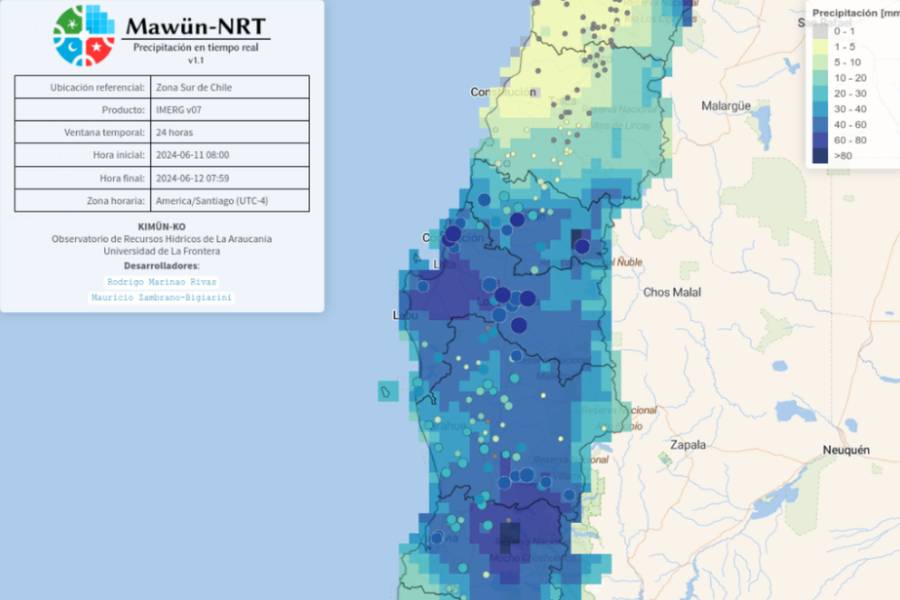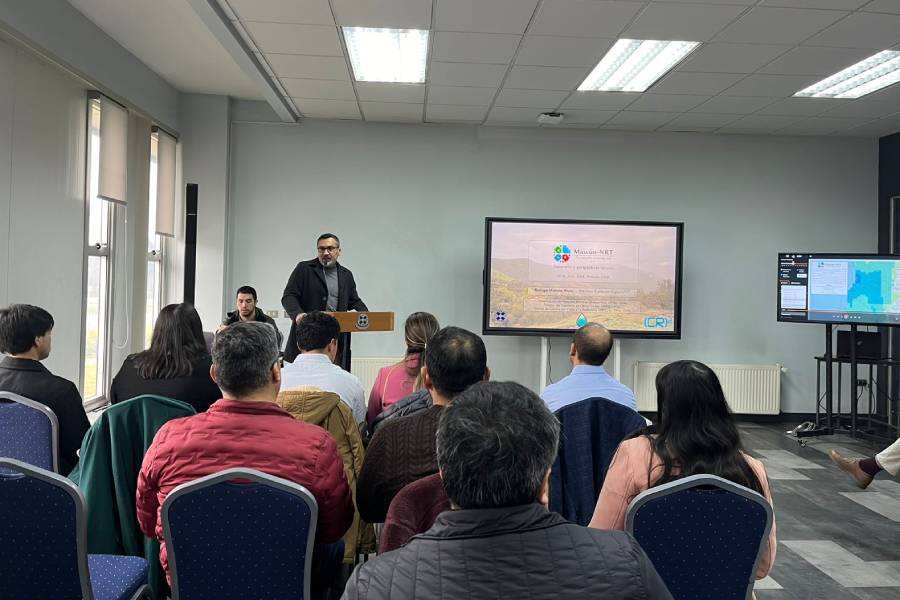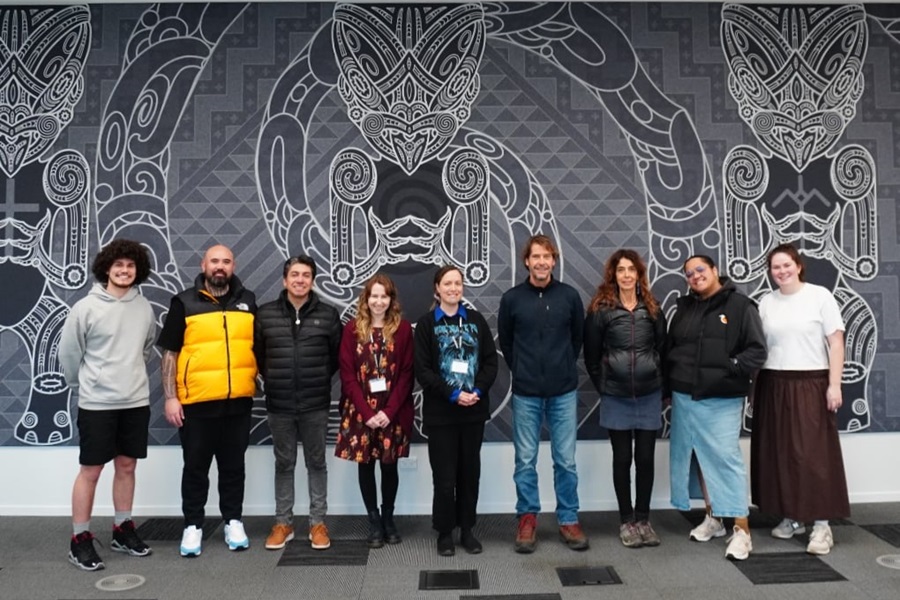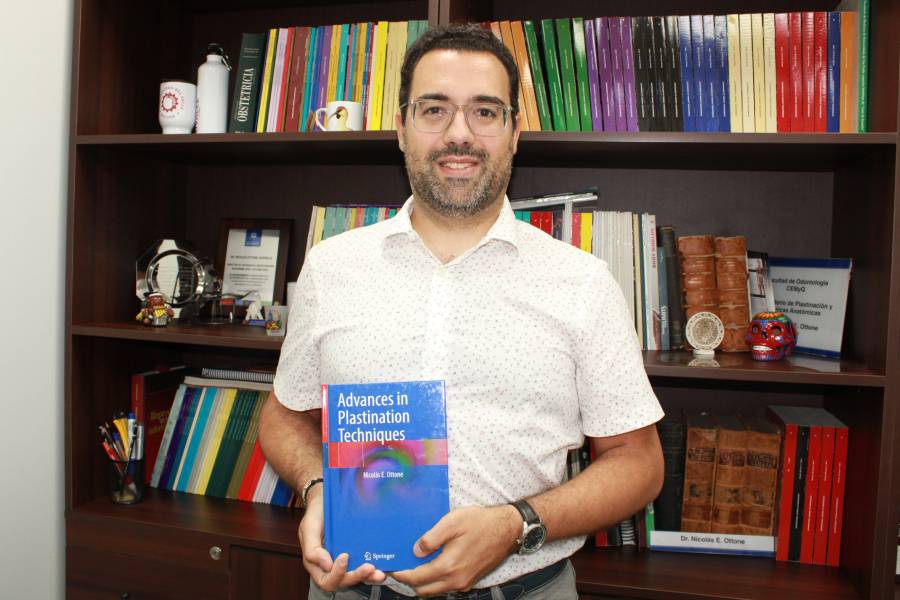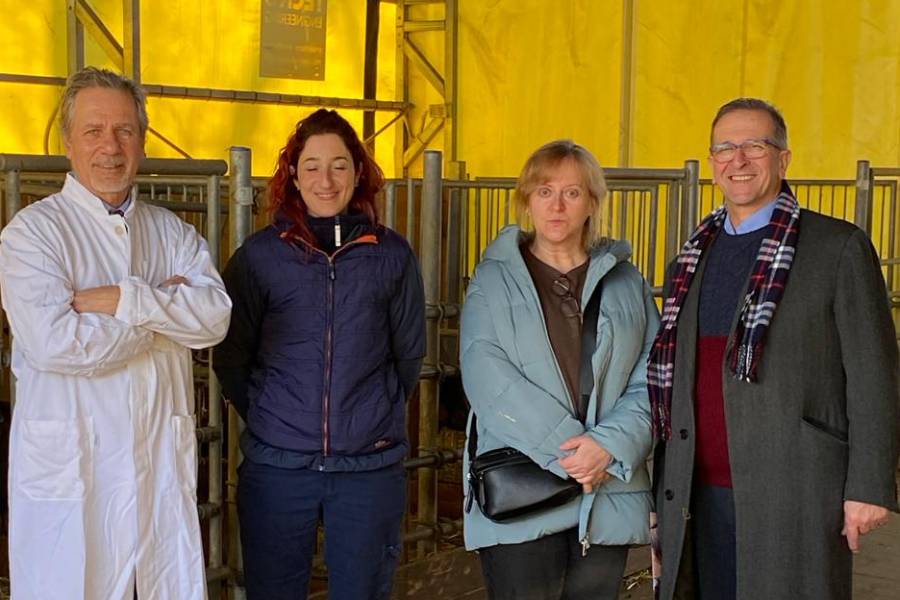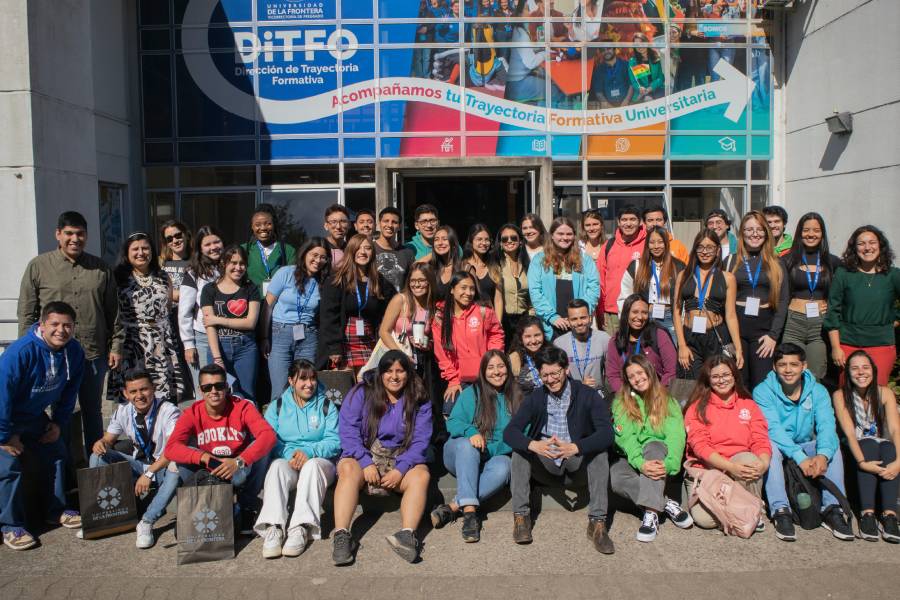|
After the recent intense hydrometeorological events that have affected the south of Chile, the group of researchers of UFROs Water Resources Observatory of the Faculty of Engineering and Science made a new rainfall monitoring platform available. |
The free and publicly accessible web platform Mawün-NRT, developed at the Universidad de La Frontera (UFRO), was recently presented to the public services department and the regional community and allows to observe the rainfall intensity and distribution in continental Chile. This new technological development is the result of a collaboration between the Observatory of Water Resources in La Araucanía (Kimün-Ko) of the Department of Civil Engineering of the Faculty of Engineering and Science, and the Center for Climate and Resilience Science (CR2), and is now a climate service available for the citizens and entities related to the decision-making in the event of bad weather fronts. The UFRO academic Dr. Mauricio Zambrano-Bigiarini explains that the idea of this platform is to “monitor extreme precipitation events occurring in our region. In addition, it is a source of information for our citizens. We put a lot of effort into the development of Mawün-NRT, to make it intuitive and easy to use, especially for the technical bodies involved in the decision-making regarding hydrometeorological risks.“ “The platform‘s use allows us to detect the potential flood zones, due to accumulation of precipitation during the days before the event that is being analyzed. In this sense, we hope that this platform will be the first step towards an early flood warning system for the La Araucanía Region,“ he added. The Vice-rector for Research and Graduate Studies of UFRO, Dr. Rodrigo Navia Diez, explained: “This platform manages spatial and temporal data that gives us a precipitation map for high-impact events, which will be very useful for decision-makers and citizens.“ “The team has been working with national and international research centers on climate change issues and achieved a development of great interest for our region in terms of applied research,“ added Franklin Valdebenito Godoy, the Director of Innovation and Technology Transfer. CHANGE OF CIRCUMSTANCES This project is a great achievement for Dr. Jorge Farías Avendaño, the dean of the Faculty of Engineering and Science. “We are witnessing how climate change presents new circumstances and challenges for society. In this context, the work led by Dr. Zambrano-Bigiarini represents our commitment and social responsibility to our future generations, which will be able to confront these and other phenomena that affect us in a better way.“ Mawün-NRT not only allows to visualize maps with the spatial distribution of precipitation, obtained from state-of-the-art gridded products, but also hourly precipitation data from rain gauges from different Chilean institutions, for example the Chilean General Water Department, the Chilean Department of Meteorology, the Chilean Agro-climate Network AGROMET, and the Center for Advanced Studies in Arid Zones (CEAZA), which are gathered and displayed on the Vismet web platform, belonging to the Center for Climate and Resilience Science (CR2). This technological development was possible thanks to the effort and dedication of the civil engineer and student of the Master’s program in Engineering Sciences, Rodrigo Marinao Rivas, who explained: “Mawün-NRT allows to close hydrometeorological information gaps. For this purpose, we integrated various sources of information from international and national centers in this platform, to obtain a more complete view of hydrometeorological events.“ Written by: Pamela Carrasco Salas, Innovation and Technology Transfer Office |
|
During his visit to Auckland University of Technology in New Zealand (AUT), Leonardo Lleuful Cruz, the Coordinator of Intercultural Affairs of the Faculty of Engineering and Science of the Universidad de La Frontera (UFRO), got to know the intercultural integration processes at AUT. |
In order to strengthen the intercultural perspective within the Faculty of Engineering and Science, the Universidad de La Frontera (UFRO) established a valuable partnership with Auckland University of Technology (AUT) in New Zealand. Within the framework of this partnership, Leonardo Lleuful Cruz, the Coordinator of Intercultural Affairs of the Faculty of Engineering and Science and academic of the Department of Civil Engineering, travelled to New Zealand to participate in a series of meetings to learn more about the integration of Māori culture and worldview in the work of AUT. Thanks to the invitation of Dr. Charles Walker, the Director of AUT‘s School of Future Environments, and the support of Dr. Ricardo Chacón, AUT‘s International Partnerships Manager, the UFRO academic was able to see and learn about how AUT incorporates interculturality in its activities, successfully promoting the recognition and appreciation of the Māori people. “This visit was fascinating and enriching because I had the chance to meet with different members of the university community, opening a variety of possibilities of integrating interculturality into the processes of our university and more specifically the Faculty of Engineering and Science,“ Leonardo Lleuful explained. “Many aspects of the Māori culture, such as Matauranga Māori (knowledge), associated with the so-called soft skills, such as teamwork, respect, and sustainability, are a successful part of the methodology, for example in research, outreach and community engagement, or undergraduate and graduate studies, with protocols that allow a respectful and balanced relationship between the cultures. That is something we also aspire to, incorporating the Mapuche worldview and culture in the internal processes of our Faculty,“ added Leonardo Lleuful. Inspired by the experience of AUT, the faculty’s Intercultural Affairs Office envisions the incorporation of ancestral Mapuche knowledge in the educational processes to complement the current educative pillars of UFRO. This strategy would also comply with UFRO‘s emerging Intercultural Relations Policy. “In the short and medium term, we want to incorporate these and other improvements within our faculty through a work plan we are developing. These actions will allow us to lead the development of interculturalism at different levels of the Universidad de La Frontera, since we are committed to becoming a bridge between the Mapuche culture and the Western culture,“ Leonardo Lleuful emphasized. Written by: Daphne Bormann Parada, Faculty of Engineering and Science |
|
This is the first-ever book on plastination techniques only, published by a publishing house. |
The outstanding professor and researcher Dr. Nicolás Ottone of the Faculty of Dentistry of Universidad de La Frontera (UFRO) made a significant contribution to the field of morphological sciences, by publishing the book “Advances in Plastination Techniques” through the prestigious Springer publishing house. Dr. Ottone is a medical doctor who has a PhD in Morphological Sciences and is the director of the Laboratory of Plastination and Anatomical Techniques of the Faculty of Dentistry and the Centre of Excellence on Morphological and Surgical Studies (CEMyQ) of Universidad de La Frontera. With great satisfaction and joy, after 17 years dedicated to this field, he was now able to publish his first book, which deals in its different chapters with topics such as the origins of anatomical techniques and plastination, the fundamentals on plastination and its different techniques, as well as aspects of biosafety and ethical considerations. This important contribution is the first-ever book on this issue. “There are no books published on plastination techniques. It is the first one worldwide. There are books on anatomical techniques, but they are published by scientific societies or individual authors and not by publishing houses, so this is the first book in the field of plastination,” Dr. Ottone explained. PLASTINATION TECHNIQUES According to Dr. Ottone, plastination allows the safe conservation of morphological and anatomical structures of human bodies, animals or other biological samples, being considered one of the most innovative techniques for the conservation of complete bodies, sections and organs, for use in teaching, research and outreach. The techniques can be used on large bodies, such as whales, elephants and complete human bodies, as well as on embryos, or small sections or organs, obtaining ultra-thin slices, thus covering from macro to micro-anatomical structures. “This book includes the explanation of each plastination technique, step by step, as well as their applications in anatomical teaching and research. In addition, some chapters describe the history of plastination and the origin of anatomical conservation techniques in general. Plastination is the most innovative technique for human and animal body conservation, but we also have other classic conservation techniques that have developed over time. Since the beginning, medical research was associated with the study of the human body, and the aim has always been to preserve it as long as possible, for being able to study it,” Dr. Ottone explained. “This technique also ensures that the specimen can be used for a long time. Currently, educational establishments have limited access to real human and animal bodies for anatomy and morphological sciences teaching, among others because of the rapid deterioration of bodies due to use and time. In this regard, plastination makes it possible to preserve morphological, anatomical, human and animal structures in a biosecure way and for an indefinite time, for teaching, research and outreach purposes. In addition, we also ensure the study of microanatomical and difficult to access structures,” he added. In his book, Dr. Nicolas Ottone also refers to the existing publications on plastination worldwide, to show what other researchers achieved. “That way,” he indicates, “we can see the advances or work carried out at other institutions and at Universidad de La Frontera”. Written by: Soledad Millapan Sandoval, Faculty of Dentistry |
|
The delegation of academics of Universidad de La Frontera visited the University of Bologna and the University of Padua, located in the Veneto region in northern Italy, to strengthen their partnerships and talk about the existing and future international cooperation agreements. |
A delegation of Universidad de La Frontera (UFRO) visited the University of Bologna and the University of Padua in Italy, to strengthen the international cooperation networks through the Master’s Programme in Agri-food Innovation and Management. “We wanted to consolidate our cooperation with the University of Bologna and made the arrangements to send a second-year student of the Master’s Programme there in September, for three months. That is very good news,” said Dr. Claudia Barchiesi, the director of the Master’s Programme in Agri-food Innovation and Management of UFRO. In addition, she explained that she was very satisfied and enthusiastic about this new opportunity for the students to broaden their horizons and to see what is happening in the world. “It is important for them to see what is happening in other so-called first world countries, which have similar problems as we do in Chile or the Araucanía Region. That way, we are not falling behind in terms of research or the way we approach different issues and can look forward to the positive effects of this cooperation,” she explained. CONSOLIDATION Within the work towards the internationalisation of the Master’s Programme in Agri-food Innovation and Management, the delegation of Universidad de La Frontera also visited the University of Padua in northern Italy, to strengthen the partnership and talk about the possibility of an international cooperation agreement. “We have already been working together for several years, but without a formal agreement. We are currently working on the bases for this cooperation, with the intention of sending another student of our Master’s Programme in Agri-food Innovation and Management to Italy next year, for an internship,” Dr. Claudia Barchiesi said. “Our idea is that also other graduate programmes of our university can make use of this partnership and the opportunities it provides, since there is growing interest in the work developed at Universidad de La Frontera on environmental and forestry topics, in terms of recovery and restoration. There is no doubt that it opens a lot of doors when we strengthen our international networks,” she added. Written by: Yasna Barría, Faculty of Agricultural Sciences and Environment |
|
A wide range of activities awaited the national and international mobility students during the orientation week, organised by the International Affairs Office to familiarise the students with the university and the city of Temuco. |
At the welcome ceremony, the International Affairs Office of Universidad de La Frontera (UFRO) welcomed the 25 national and international mobility students, who will spend the first semester of 2024 at the Faculties of Law and Business (four mobility students); Education, Social Sciences and Humanities (nine mobility students); Engineering and Sciences (five mobility students); and Medicine (seven mobility students). Antonia Espinoza of the Student Mobility Office explained: “Our welcome programme for national and international mobility students includes this orientation week, which aims at helping the students to get to know our campuses, services, administrative processes, and extracurricular activities, as well as to receive academic advice. In addition, it helps them to adapt to this new environment, also thanks to our Buddy Programme, with UFRO students, who orient and help them with their adaptation, so they are well-prepared to face the challenges they might have to confront during their stay”. In this regard, the students from Brazil, Chile, Colombia, Spain, Mexico and the Netherlands started their journey by getting to know the enrolment process and details for subject registration for their semester at UFRO. The orientation week also included a presentation by the Student Development Office, about issues related to student health and support. The Training Development Office also presented the elective subjects the students can choose from, as well as the language course offer, which includes Spanish and English, among others. DISCOVERING THE NEW ENVIRONMENT During the week, the mobility students also had the opportunity to get familiarised with the Andrés Bello Campus, on a tour, where they got to know the Central Library, the 24-hour Study Hall, the canteens and cafeterias, as well as other important places on the campus. Another highlight of the week was a guided tour around the city of Temuco, where they visited the most emblematic places, such as the National Railway Museum and the Urban Park “Isla Cautin”. During the workshop “Living Abroad”, the students were able to acquire important knowledge and tools for their time in Chile, and on the last day of the orientation week, they enjoyed the welcome activities organised by the Buddy Programme of UFRO, to be fully prepared for their start at UFRO.
Written and translated by: UFRO Communications Office
|





